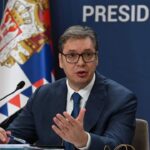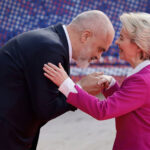- Vučić pitches plan to protect Serbian interests in Kosovo
President of the Republic of Serbia, Aleksandar Vučić, addressed the nation on September 13, presenting an action plan aimed at protecting the Serbs in Kosovo and Metohija and the interests of Serbia in the Republic of Kosovo.
The plan consists of the following five steps:
I. Return to the status quo ante.
II. Kosovo and Metohija shall be a territory of special social protection.
III. Stability of Serbian institutions in Kosovo and Metohija shall be ensured
IV. A special prosecutor’s office shall be created
V. A decision shall be taken on the illegality of all bodies and institutions on the territory of Kosovo and Metohija, created after the declaration of independence and the invalidity of all acts that were or will be adopted by them.
The first step consists of seven points.
1. Announcing and holding free and democratic local elections in the north of Kosovo and Metohija with the participation of the OSCE mission and under EU control.
2. Serbs returning to the Regional Police Department in the North.
3. Serbian judges and prosecutors returning to their positions.
4. Withdrawing special units of the Kosovo police from the North.
5. Immediately forming the Association of Serbian Municipalities (ASM).
6. Immediately releasing all detained participants in peaceful protests arrested by the Kosovo police.
7. Ensuring uninterrupted operation of payment transactions and postal services.
The second step – Kosovo and Metohija being a zone of special social protection – envisages the launch of government programs aimed at supporting the Serbs in Kosovo and Metohija.
The third step is the stability of the Serbian institutions of Kosovo and Metohija.
Offices shall be opened near the administrative line, where Serbs from northern Kosovo and Metohija will have access to state and administrative services. Serbs from KiM will also be part of these institutions.
The fourth step is the creation of a special prosecutor’s office to prosecute those involved in the oppression of Serbs in Kosovo and Metohija.
The fifth step – the decision on the illegality of all the institutions of Kosovo and Metohija, created after the declaration of independence and the invalidity of all the acts that were or will be adopted by them – was compared by Vucic with the decisions taken in Yugoslavia regarding the occupation authorities after the World War 2. However, Kosovo is not recognized as an occupied territory.
The address by the President of Serbia was partially supported by the EU.
European Union spokesman Peter Stano welcomed the parts of Vučić’s address that refer to Serbs’ renewed participation in the elections in Kosovo and reintegration into all the Kosovo institutions they were pulled from back in 2022.
At the same time, the EU spokesman warned that inflammatory rhetoric and unilateral actions are against the dialogue, threaten the normalization of relations between Kosovo and Serbia and public security.
Brussels made no predictions on how the action plan presented by Vučić will affect the course of the EU-mediated dialogue.
- Charges brought against 45 participants of terrorist attack in Banjska
The Special Prosecutor’s Office of Kosovo forwarded to court an indictment against 45 members of the Serbian armed group, which on September 24, 2023, attacked the Kosovo police forces near the village of Banjska in the municipality of Zvecan in the north of Kosovo. As a result of the ambush, one policeman was killed.
The prosecutor’s office qualified the attack as terrorism.
The defendants are charged with criminal offenses related to terrorism, including criminal offenses against the constitutional order and security of the Republic of Kosovo, financing of terrorism, and money laundering.
The Prosecutor’s Office of Kosovo noted that among the main defendants is Milan Radojicic, who led the group and played an important role “in coordination and criminal activity.”
Milan Radojicic, a former deputy chairman of the Serbian List party and entrepreneur from northern Kosovo, claimed responsibility for the attack in Banjska shortly after last year’s incident. He was arrested in Serbia a few weeks into the attack before being shortly released.
According to representatives of Kosovo, the lack of punishment for the organizer of the attack and the reluctance to extradite him to Kosovo is evidence of the involvement of the Serbian authorities in the Banjska attack.
- Serbia, Israel shortly to conclude a free trade agreement
The signing of the free trade agreement between the two countries and prospects for cooperation in various fields were discussed in Belgrade by Presidents Aleksandar Vučić and Yitzhak Herzog.
The talks focused on expanding cooperation in the research and technical field, in particular, in innovative technologies, artificial intelligence, and cyber security.
Regional media recall that in 2020, the Security Information Agency (BIA) of Serbia was included in the list of users of the software produced by Israel’s Circles, which allows for locating any phone in a matter of seconds.
The visit of the Israeli president to Serbia came against the background of accusations regarding the export of Serbian weapons to Israel, which causes concern in the international community in view of the situation in the Middle East.
A BIRN investigation revealed that Serbia’s main state arms dealer, Jugoimport–SDPR, exported EUR7.3 million worth of arms and ammunition to Israel in July 2024. The total value of exports from Serbia to Israel in 2024 has already exceeded EUR 23 million.
According to the media, Israeli military aircraft made five flights from Belgrade Nikola Tesla Airport to the Israeli military base Nevatim in July, which is in line with arms exports data. Six more flights were also recorded in February, March, and May 2024, which also matched the export data.
As Haaretz notes, over the past 10 months, Serbia has become the leader among the countries from which Israeli military aircraft depart, second only to American bases around the world.
- Hungary, presiding over EU, opposes sanctions against Dodik
Hungarian Prime Minister Viktor Orbán spoke out against imposing sanctions on Republika Srpska President Milorad Dodik, stressing the importance of dialogue and cooperation for stability in the Western Balkans. The Hungarian Prime Minister stated this during a meeting with the leader of the Bosnian Serbs in Budapest. “The stability of the Western Balkans is crucial for the EU. Instead of lectures and sanctions, we believe in dialogue and cooperation. My meeting with Dodik was held precisely for this purpose,” Orban wrote on X following the meeting.
Hungarian Foreign Minister Peter Szijjártó went further, saying that Dodik is a “regional leader of stability” and that consultations with him are always useful.
Dodik is currently under US and UK sanctions over his statements and actions undermining the sovereignty of Bosnia and Herzegovina and calls for the secession of Republika Srpska from BiH. The restrictive measures apply not only to the leader of the Bosnian Serbs, but also to his political allies and family, as well as to affiliated entities. However, EU sanctions against Dodik have not yet been introduced. It is obvious that the situation will not change throughout the Hungarian presidency.
- Skopje sends note of protest to Bulgaria
This happened after the state flag of North Macedonia was missing during the meeting of the two presidents, Rumen Radev and Gordana Siljanovska-Davkova, in Sofia
North Macedonia officially demands that Bulgaria apologize and explain why there is no Macedonian flag in the joint photo showing the two leaders.
The Ministry of Foreign Affairs of North Macedonia noted that the details of the meeting, including the placing of the flags, were agreed between the protocol services of the two states in Sofia even before the departure of the Macedonian delegation led by Siljanovska-Davkova.
Prime Minister Hristijan Mickoski, commenting on the incident, harshly criticized the Bulgarian side. In his opinion, the case proves “Europe and the world” that Sofia’s claims to Skopje are not limited to the demand to include Bulgarians in the Macedonian constitution, stretching much broader.
Although the meeting between the presidents of Bulgaria and North Macedonia took place in a friendly atmosphere, the incident involving the missing flag led to another aggravation of the already complicated relations between the two countries.
- Analysts believe Russia behind protests against lithium mining in Serbia
The likely organizer of the protests against lithium mining in Serbia and Belgrade’s cooperation with the EU in this area is Russia. A wide range of pro-Russian participants —media, political parties, and extremist organizations — were involved in mobilizing the population. Disruption of the agreement is in the interest of the Russian government.
This is stated by the Center for Defense Reforms entitled “Russian Influence on Environmental Protests in Serbia, August 2024”.
“Protests organized by environmental organizations and entrepreneurs are also supported by Russia’s diplomacy, in particular by the Ministry of Foreign Affairs, and representatives of the Serbian government with Russia ties. For example, Aleksandar Vulin, who was awarded Russia’s Order of Friendship,” says the report. The authors of the paper recall that Vulin claimed that protests against lithium mining in Serbia are part of preparations for a coup by the West.
A network of pro-Russian organizations, including far-right groups, football ultras, environmental organizations and opposition parties, is influencing and mobilizing citizens to participate in protests aimed at disrupting lithium projects, the report emphasizes. Analysts note that the campaign was endorsed by Russian state media, including RT (Russia Today) Balkans and Sputnik Serbia, which actively covered protests and arrests of activists.



